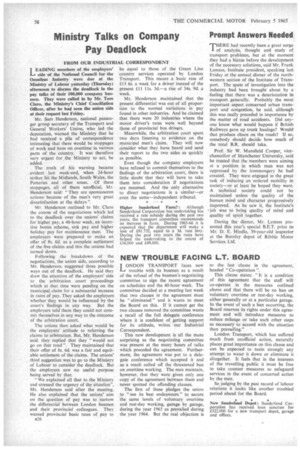Ministry Talks on Company Pay Deadlock
Page 60

If you've noticed an error in this article please click here to report it so we can fix it.
FROM OUR INDUSTRIAL CORRESPONDENT FADING members of the employers' J—■ side of the National Council for the Omnibus Industry were due at the Ministry of Labour yesterday (Thursday) afternoon to discuss the deadlock in the pay talks of their 100,000 company busmen. They were called in by Mr. Tom Clam, the Ministry's Chief Conciliation Officer, after he had seen the union side at their request last Friday.
Mr. Sam Henderson, national passenger group secretary of the Transport and General Workers' Union, who led the deputation, warned the Ministry that he had received a pile of correspondence intimating that there would be stoppages of work and bans on overtime in various parts of the country. It was therefore very urgent for the Ministry to act, he added.
The truth of his warning became evident last week-end, when 24-hour strikes hit the Midlands, South Wales, the Potteries and other areas. Of these stoppages, all of them unofficial, Mr. Henderson said: "They are spontaneous actions because of the men's very great dissatisfaction at the delays ".
Mr, Henderson outlined to Mr. Claro the course of the negotiations which led to the deadlock over the unions' claims for higher pay, a 40-hour week, an incentive bonus scheme, sick pay and higher holiday pay for maintenance men. The employers were prepared to make an offer of 8s. 6d. as a complete settlement of the five claims and this the unions had turned down.
Following the breakdown of the negotiations, the union side, according to Mr. Henderson, suggested three possible ways out of the deadlock. He said they drew the attention of the employers' side to the arbitration court proceedings which at that time were pending on the municipal claim for a substantial increase in rates of pay. They asked the employers whether they would be influenced by the court's findings in any way. But the employers told them they could not commit themselves in any way to the outcome of the arbitration court.
The unions then asked what would be the employers' attitude to referring the claims to arbitration. But, Mr. Henderson said, they replied that they "would not go on that road ". They maintained that their offer of 8s. 6d. was a fair and equitable settlement of the claims. The unions' third suggestion was to go to the Ministry of Labour to consider the deadlock. But the employers saw no useful purpose being served by that.
"We explained all that to the Ministry and stressed the urgency of the situation", Mr. Henderson said after the meeting. He also explained that the unions' aim on the question of pay was to narrow the differential between London busmen and their provincial colleagues. They wanted provincial basic rates of pay to n26 be equal to those of the Green Line country services operated by London Transport This meant a basic rate of 13 6s. a week for a driver instead of the present ill us. 3d.—a rise of 34s. 9d. a week.
Mr. Henderson maintained that the present differential was out of all proportion to the normal variations in pay found in other industries, And he claimed that there were 20 industries where the motor driver's rates were well beyond those of provincial bus drivars.
Meanwhile, the arbitration court spent two days listening to evidence on the municipal men's claim. They will now consider what they have heard and send their report to the two sides as quickly as possible.
Even though the company employers have refused to commit themselves to the findings of the arbitration court, there is little doubt that they will have to take them into consideration if negotiations are resumed. And the only alternative to direct negotiations is a similar—or even the same—independent tribunal.


















































































































































































